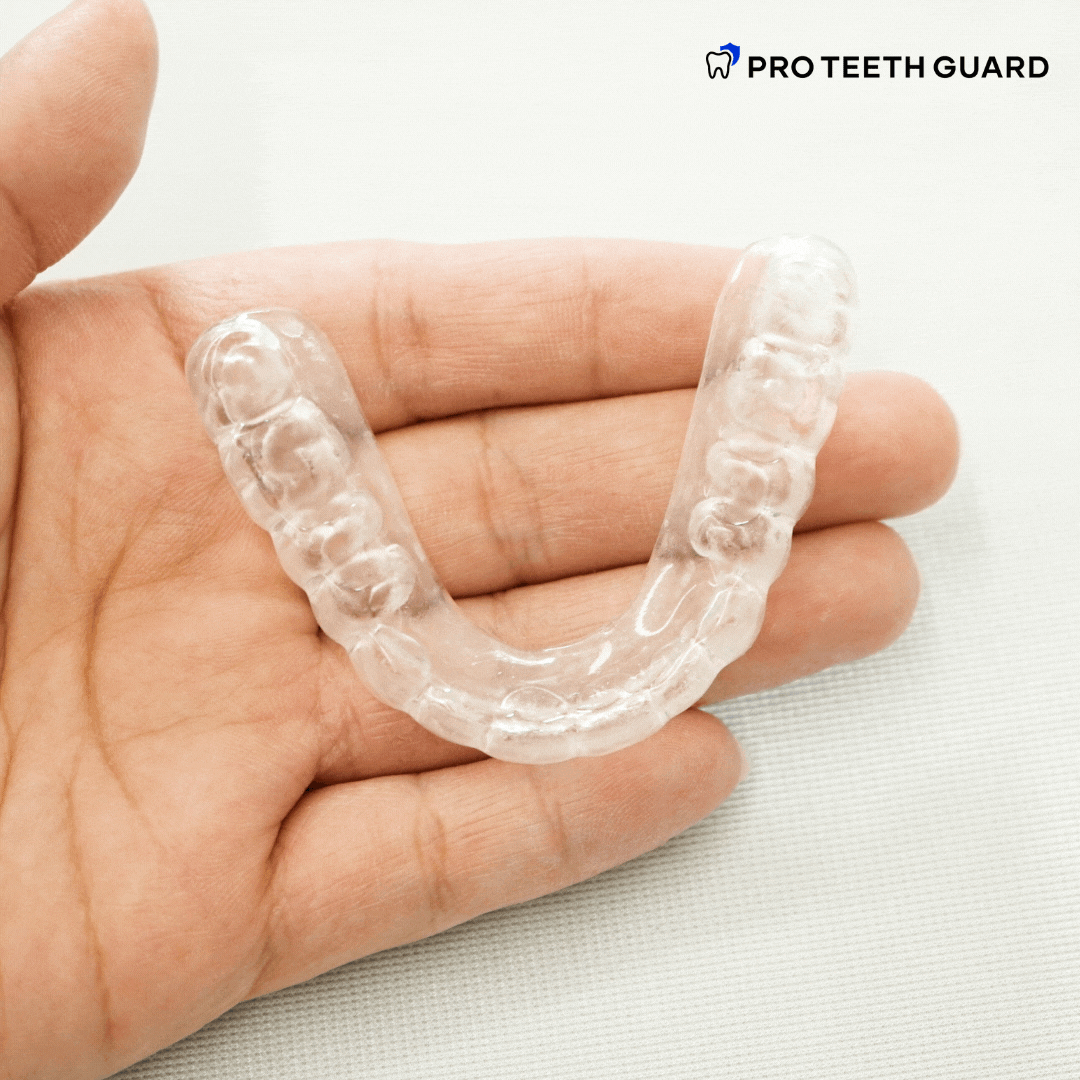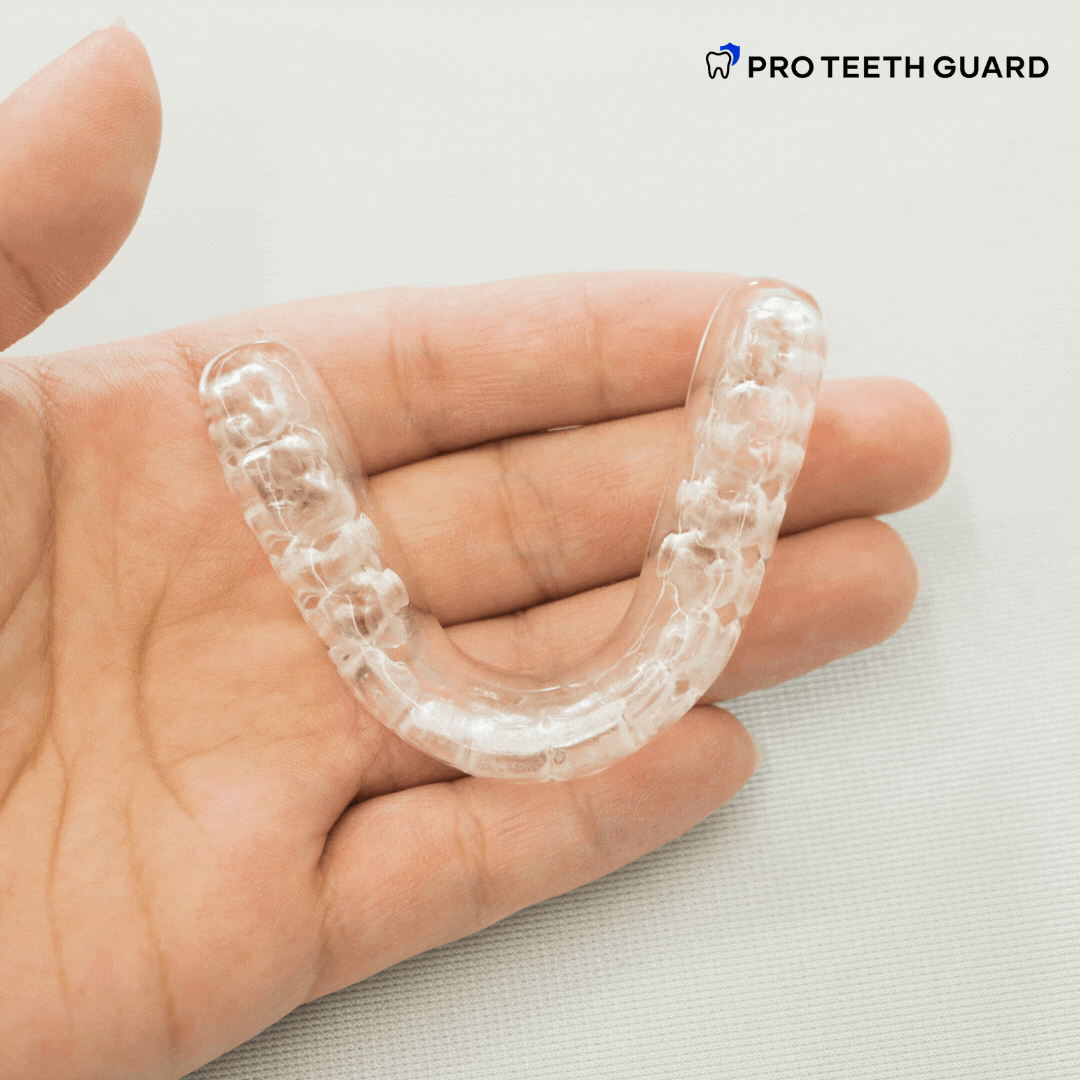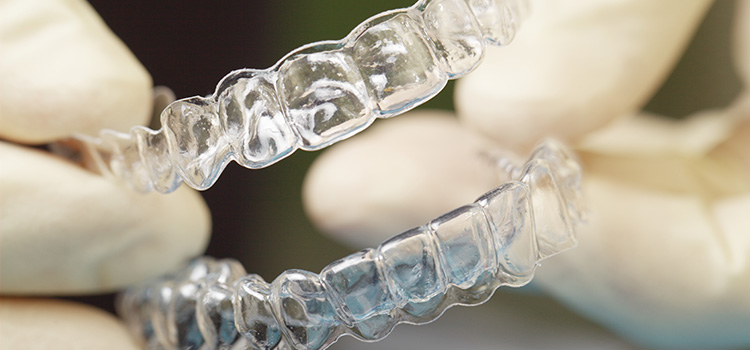Soft vs Hard Night Guard
5th Apr 2020

If you have bruxism, you likely are a teeth grinder or clencher. You might grind or clench at night or during the day. Bruxism can be treated in many ways, but a night guard is a very common and noninvasive treatment. You should first understand the pros and cons of different types of dental mouth guards, including soft vs hard night guard to be able to choose the best night guard for your bruxism.
The purpose of a night guard (your dentist may call it a dental guard, occlusal guard, or bite splint) is to protect your teeth and reduce the symptoms of bruxism. Soft night guards and hard night guards are two popular options. The type of night guard you’ll want depends on quite a few factors, which we’ll discuss in this blog.
Different Types of Custom-Fit Night Guards
Every type of professionally made custom night guard is truly a custom-fit guard. They are all fabricated in dental labs using impressions of your teeth. Regardless of which you choose, you can trust it will fit your teeth perfectly.
Soft Night Guard
A soft night guard is made of a soft material — it’s pliable rubber that is more flexible than the other two options. This is typically used for people with mild bruxism or for people who clench but don’t grind their teeth.
Soft night guards tend to have a more comfortable fit, which may encourage consistent use, thereby having a positive effect on reducing teeth grinding.
Pros of Soft Night Guards
- Comfort: May feel less bulky or obtrusive in your mouth. Easier to wear, especially for beginners.
- Flexibility: A softer feel makes it more comfortable for light grinders.
- Cost: generally more affordable.
Cons of Soft Night Guards
- Durability: wears out faster and may need to be replaced sooner.
- Protection: Less efficacy for people with severe grinding or clenching.

Hard Night Guard
A hard night guard is made of hard acrylic materials — it’s not pliable, nor will it feel flexible in your mouth. This type of night guard is typically used by people with more severe case of grinding and clenching.
For those who experience significant tension in their jaw muscles due to bruxism, a hard night guard may provide the necessary support to alleviate pressure and prevent further dental damage.
Pros of Hard Night Guards
- Durability: Lasts much longer, ideal for heavy grinders.
- Protection: Provides superior protection and relief against severe grinding and clenching.
Cons of Hard Night Guards
- Comfort: Can be less comfortable at first, requiring periods to adjust.
- Cost: More expensive than soft guards, but offers better long-term value.

Dual Laminate (Hybrid) Guard
A dual laminate guard is a third option that you may not have heard of—it’s made of a soft inner layer and a hard outer layer.
This combination of materials provides the durability needed to withstand grinding while still offering the comfort that allows for a restful night's sleep.
Pros of Dual Laminate Guards
- Comfort: The soft inner layer makes it easy to wear.
- Durability: The hard outer layer provides strong protection.
- Versatility: Ideal for moderate to severe grinders.
Cons of Dual Laminate Guards
- Cost: More expensive than soft guards.
- Adjustment: It may take time to get used to the dual layers.

- Most Popular
- Hard Outside, Soft Inside
- 2MM Thick
- Moderate / Heavy

- Most Durable
- Hard Materials
- 1.5MM Thick
- Heavy / Severe

- For Day Time Use
- Thin, Barely Visible
- 1MM Thick
- Light / Moderate

- For Clenching
- Flexible & Soft
- 1.5MM Thick
- Light / Moderate
Research on Soft and Hard Night Guards
While participation sample sizes have traditionally been small, research provides insights into the advantages and disadvantages of both hard and soft night guards.
These studies help us understand how they affect conditions like bruxism and TMJ (also called TMD).
- TMJ (Temporomandibular Joint Disorder) refers to disorders affecting the jaw joint.
- Bruxism (teeth grinding) is thought to be a possible cause of TMJ.
Here are 4 studies that examined the effectiveness of hard and soft mouth guards:
- One study with 50 patients found both hard and soft mouth guards to be effective, but soft guards worked better after four months for TMJ patients. Please note that if you have TMJ, purchasing a night guard over-the-counter or online is not recommended. It’s important to consult a dental professional to get a recommendation for the best treatment unique to your situation.
- A small study with ten participants found hard night guards were better at reducing jaw muscle activity in people with bruxism. Interestingly, soft guards might increase muscle activity, encouraging more clenching or chewing. This suggests hard mouth guards could be a better option for heavy grinders.
- A different study with 115 participants compared the short-term effects of hard and soft splints and found soft splints resulted in a decrease in maximum bite force. In addition, the study observed an improvement in sleep quality for patients using soft splints.
- Another study involving 40 patients found that patients using soft night guards improved more and were more likely to stick with treatment compared to those using hard night guards.
These studies only show trends among small populations and the results are far from conclusive. At the end of the day, everybody is going to respond to different types of night guards differently. Consider these findings in making your decision, but don’t forget to base the decision on your own unique experience.
Related Articles:
- Does Dental Insurance Cover Night Guards?
- Dentist Night Guard vs. Over-The-Counter
- Night Guard Thickness

Other Considerations for Choosing a Night Guard
When choosing between a soft and hard night guard, it's essential to consider how each type can accommodate the condition of your teeth and overall oral health.
Dental Work and Veneers
For those with dental work, a soft night guard is often recommended, especially if you don't have a history of heavy grinding. It’s flexible and can accommodate dental work such as veneers, fillings, or crowns.
Those with dental work should take care when considering a hard night guard. For example, wearing a hard mouth guard over veneers, crowns, or implants may loosen the dental work due to inserting and removing the hard guard on a daily basis.
If you’re a heavy grinder with dental work, it’s best to seek a professional recommendation for the type of guard that would work best. For example, if you have a crown on an upper tooth, your dentist may recommend a lower hard night guard since wearing it will not interfere with the crown.
Missing Teeth
Hard night guards are ideal for those missing teeth because they allow a dental lab technician to fill in the gaps, helping support and align your teeth. This prevents nearby teeth from shifting or moving into the empty space.
Soft mouth guards are more flexible and don’t provide the same level of support, making them less effective for missing teeth.
Retainers
You can still wear a night guard even if you use a nightly retainer. However, a retainer isn’t designed to cushion and protect your teeth like a night guard.
The best mouth guard for you depends on the type of retainer you have. It’s a good idea to consult your dentist for a specific recommendation.
Over-the-Counter Night Guard vs. Custom Night Guard
In comparing the different types of night guards in this article, we’ve focused on custom-made night guards. Over-the-counter night guards bought from drug stores are a cheaper option; however, they come with their limitations. Here are the pros and cons of custom-made night guards vs over-the-counter options.
Custom Night Guards
- Pros: Tailored specifically to your bite, ensuring a more comfortable and secure fit. Better for long-term use and heavy grinding.
- Cons: More expensive but offers a longer life span.
Over-the-Counter Guards
- Pros: Cheaper and readily available.
- Cons: Less comfortable, less effective, and may not provide adequate protection for long-term use or for severe grinding.
Related Articles:

FAQs
Are soft and hard mouth guards equally effective?
Studies have shown both soft and hard night guards are effective in treating the symptoms of bruxism and TMJ disorder. However, some studies have shown patients responded better to soft night guards, while other studies showed that hard night guards were more effective.
Most of the clinical studies were done with small populations, so it’s difficult to make a general conclusion. It’s safe to say different people respond differently to soft vs hard night guards, so the most effective treatment depends on the patient.
Should I get a soft night guard or a hard night guard?
As a general guideline, you can make the decision based on the severity of your teeth grinding. Soft night guards provide flexibility and comfort and are suitable for mild grinding, while hard night guards are more rigid, offer durability and protection, and are better for heavy grinding.
However, the most effective solution depends on how you react to the night guard. If you find that a soft night guard makes you grind and clench harder, or if wearing a hard night guard is uncomfortable, you may be better served with a different type of guard. Consult a dental professional to get a personalized recommendation based on your unique circumstances.
Benefits of a Night Guard (Whether It’s Soft or Hard)
Regardless of whether you decide on a soft or hard night guard, you’ll do your teeth and overall oral health a favor by protecting them with a dental mouthguard.
Both hard and soft guards help relieve soreness in your face and jaw muscles, relieve a sore jaw and even jaw discomfort, reduce headaches, and protect your teeth from damage. They can also help treat bruxism before it escalates to temporomandibular joint dysfunction (TMJ or TMD).
Choosing the right type of mouthpiece, whether soft or hard, significantly depends on your individual needs, as each appliance offers distinct benefits for managing bruxism effectively.
Sources:

- Most Popular
- Hard Outside, Soft Inside
- 2MM Thick
- Moderate / Heavy

- Most Durable
- Hard Materials
- 1.5MM Thick
- Heavy / Severe

- For Day Time Use
- Thin, Barely Visible
- 1MM Thick
- Light / Moderate

- For Clenching
- Flexible & Soft
- 1.5MM Thick
- Light / Moderate

